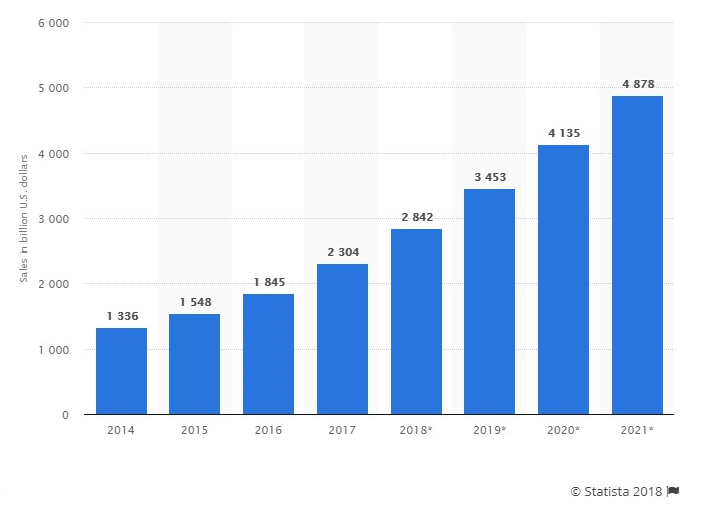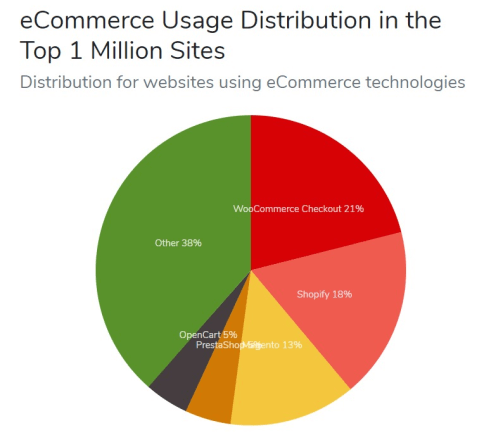The e-commerce industry is booming. According to Statista, retail e-commerce sales worldwide are projected to reach $4.88 trillion by 2021. If you want to be a part of this growing industry, you need to invest in the latest technology, especially when building your e-commerce store.

However, choosing the best e-commerce platform is far easier said than done. There are many options available with varying degrees of features and limitations. Making a wrong decision in this regard can cost you dearly, as a faulty online store can ruin your business reputation. So, you should choose the right platform from the beginning.
Let’s start with the four things to consider when selecting an e-commerce platform.
Things to Consider
Before selecting an e-commerce platform, it is necessary to keep a few things in mind. Be sure to use these factors as the baseline to make a calculated decision.
1. It Should Address Your Specific Shipping Needs
Whether you are selling t-shirts or furniture, shipping is going to be the backbone of your online business. The platform you choose must support your unique shipping requirements including integration of third-party Warehouse Management Software (WMS) and real-time communication.
Chances are, you will hire a carrier for shipping your sales and handling returns. Make sure the platform you choose is compatible with their inventory management software. It should also support automated email communication with customers, carriers, as well as your back-end office whenever a sale occurs or return order gets placed.
It should support automated order confirmation, order tracking, feedback or complaint, and return or replacement emails to your clients. You may need to add new locations, change instructions or rules, and add new features to your system over time. So, the platform should be flexible enough to make these changes without hassle or delay.
2. Your Team Should Be Able to Handle It
In most cases, e-commerce owners are primarily concerned about the user interface on their customers’ end. However, you will also need to think about your back-end management team. They will be spending a lot of time managing your daily operations. So, your platform should have an easy-to-use interface for your team.
Before selecting a platform, think about who is going to handle it every day.
- How good are their technical skills?
- Can they handle the existing UI?
- Will there be any modifications required over time?
- Is the platform flexible enough to make those changes?
- Does the platform have a 24/7 support system to help your team in case they encounter a problem?
- What kind of analytics support is provided?
- Can it analyze transactions, purchase histories, user behavior, e-commerce SEO factors, generate reports on abandoned carts, and list the most visited product categories/pages?
The platform should streamline the transaction flow from your customers’ end to your management team in one go. Remember, a system riddled with gaps and breaks will translate to a poor user experience for everyone.
3. Integrations and Plugins
Your e-commerce platform alone is not enough to run your online store. You will need to use various third-party software and plugins for performing different tasks. For example, you will need:
- Accounting plugins for managing sales, taxes, revenues, and profits.
- Email marketing plugins to connect with your customers.
- Shipping tools to handle your orders and returns.
You will also need to integrate your existing business systems with your online store. For example, if you are using different inventory management software at your physical store, you will need to integrate it properly with your online platform. As a result, you will need to consider integration costs as well.
4. Scalability
Your online store will need to support your growing business. A sluggish platform with errors is a kiss of death for your online business. The platform should handle new features, products, plugins, and increased web traffic without fail. That’s why you need to check the scalability of a platform.
Don’t be shortsighted. Choose a platform that is a good fit for your business not only today, but also in the future. However, you don’t want to pay for the features that you aren’t using today. Make sure the platform can grow with your business without putting a hole in your pocket.
The Best E-Commerce Platforms
Now that you know the factors you need to consider before choosing an e-commerce platform. Let’s take a look at some of the best performing options out there. The purpose of this list is to hit the ground running for your search, saving time and effort.
1. WooCommerce
WooCommerce is an open source e-commerce plugin designed to seamlessly integrate with WordPress (WP) sites. It is now the most popular e-commerce platform on the web, powering over 21% of all online stores. Brands such as Singer, Orange Guitar Amps, Weber, and Airstream use WooCommerce websites.

Pricing
The basic version is free. You can find web hosting as low as $6.95/month, depending on your traffic and size of your store.
Benefits
- Being an open-source software, you have complete control over customizations as per your needs.
- The core software comes free of cost.
- It features a secure and robust shopping cart.
- You get access to thousands of themes, plugins, tools, and features.
- The large developer community can help design customized plugins to enhance specific functionalities of your e-commerce store.
- WooCommerce has strong SEO capabilities. It provides a comprehensive collection of analytics with an intuitive interface.
- The number of products and categories you can have is not limited.
Drawbacks
- It is not a complete e-commerce content management system, just a WordPress plugin. So, you can’t use it for any other website.
- It may not be cost-effective, depending on your needs, as the costs for third-party plugins and features can quickly add up.
- As WooCommerce doesn’t offer a hosted solution yet, hosting and security is your responsibility.
- Implementing multi-currency is tough.
- Using the wish list functionality is hard in WooCommerce.
- It lacks scalability, especially for fast-growing stores or stores with a lot of products to manage.
Key Takeaway
If you are familiar with WordPress or already have a WP site, using WooCommerce will be a piece of cake. SMBs can also benefit from this plugin for setting up small online stores. But, the lack of scalability may force you to migrate to another platform as the business grows.
2. Shopify
Shopify is the second most popular e-commerce platform – with 18% market share. It’s a hosted solution that offers almost everything you need to run an online store. WaterAid, The New York Times Shop, Penguin Books, and Tesla Motors are some of the major brands using Shopify.
Pricing
The basic Shopify plan starts at $29.00 per month.
Benefits
- The platform is easy to use and set up.
- The built-in cart abandonment recovery feature allows quick tracking of incomplete sales.
- It offers numerous mobile-optimized free and paid themes, and has a large app marketplace.
- It easily syncs with social media channels such as Facebook, Instagram, Pinterest, and even Amazon.
- It boasts a user-friendly inventory management system.
- It supports several third-party payment gateways.
Drawbacks
- Costs can quickly add up in Shopify, as you have to pay for several apps, plugins, tools, and themes. You may have to pay a one-time fee for some features, while quite a lot of plugins have recurring monthly fees.
- Shopify also charges a transaction fee on most third-party payment gateways.
- Making DIY code changes is challenging as Shopify uses its own markup language called Liquid, which is based on Ruby on Rails (we can help you with that).
Key Takeaway
Shopify is suitable for beginners, owing to its easy setup and user-friendly interface. Small and medium businesses can also use Shopify to launch their online store, but only with the help of additional tools and plugins.
(Interested in joining Shopify? Create an account here for a free 14 day trial. If 14 days isn’t enough, give us a call. As a Shopify partner, we can create an unlimited trial for you.)
3. Magento
Magento is an open-source e-commerce website platform with 13% market share. You can download and install it on your servers. Many leading global brands such as Victoria Beckham, Nike, Jaguar, Olympus, and Everlast use the Magento platform.
Pricing
The basic version is free. You may have to pay for hosting, premium plugins or templates, and customization.
Benefits
- Being an open-source platform, you have complete control over the platform design and development.
- The large marketplace offers plenty of paid and free tools, features, plugins, modules, widgets, and themes.
- You can create different websites in different languages if your business spans multiple territories.
- The core code is continuously updated to ensure seamless customization.
Drawbacks
- Being an open-source platform, the bulk of responsibilities like updates, security, etc. is with the site owner.
- Although the basic version is free, you’ll need to spend around $20,000/year for the hosted version.
- Owing to the complicated code, customization takes plenty of time and requires professional developers. As a result, you need to make a significant investment in customization.
- Inexpensive hosting accounts aren’t going to cut it. You will need a host that is made especially for it, or allows your web developer to customize what PHP modules are running.
Key Takeaway
For large stores with an international customer base, Magento seems to be the perfect e-commerce platform. But, small players should stay away from it. Magento is not recommended for beginners or DIY shop owners.
4. BigCommerce
BigCommerce is a well-known e-commerce platform used by bigwigs such as Toyota, Martha Stewart, Ben & Jerry’s, and Original Moxie. The platform shares striking similarities with Shopify. However, it offers better digital marketing settings, analytics, and other modules.
Pricing
Standard BigCommerce starts at $29.95 per month.
Benefits
- It comes with a visual store builder.
- You get plenty of customizable and responsive templates, as well as a secure shopping cart.
- It offers unlimited products, orders, file storage, and bandwidth.
- You can accept payments via third-party payment gateways like PayPal, Stripe, Apple Pay, Pay with Amazon, and more with no transaction fees.
- You also get multi-layered hosting security with DDOS protection.
- It also integrates with social networks such as Facebook, Pinterest, Amazon, and eBay.
- It offers multi-currency support.
- Flexible shipping options allow you to manage inventory efficiently.
- It comes with various marketing tools with elaborate controls.
Drawbacks
- You only get a few free templates (just seven), while paid themes are quite costly. Advanced features such as abandoned cart saver are also expensive.
- Design customizations may not always be user-friendly. Beginners may find the editing interface a bit tricky as it uses a lot of complicated tech-speak.
- There are no native POS features. The plans also come with sales limits.
Key Takeaway
Although BigCommerce is an excellent alternative, it is more suitable for large and fast-growing stores. So, it may not be a cost-effective alternative for SMBs.
We can help you decide.
As you can see, there is no one-size-fits-all solution when it comes to choosing an e-commerce platform. In the end, it all comes down to your business requirements, future outlook, technical knowledge, and integrations. Keep these four pointers as well as the pros and cons of top e-commerce options in mind when choosing your platform.
Of course, at Ayokay we specialize in custom ecommerce stores, and can build for any of the platforms mentioned in this article, as well as others. We would be happy to discuss the best option for your business.
Jack Shepler is a Marketing and Search Engine Optimization expert. He founded Ayokay, award-winning marketing, and web design firm in Indianapolis, Indiana that has built brands, increased sales for businesses, and helped nonprofit organizations fulfill their missions since 2011. He uses his decades of experience to educate through the Ayokay blog and through public speaking. You can follow him on LinkedIn.








Choosing the Best E-Commerce Platform for Your Online Store – interesting article.